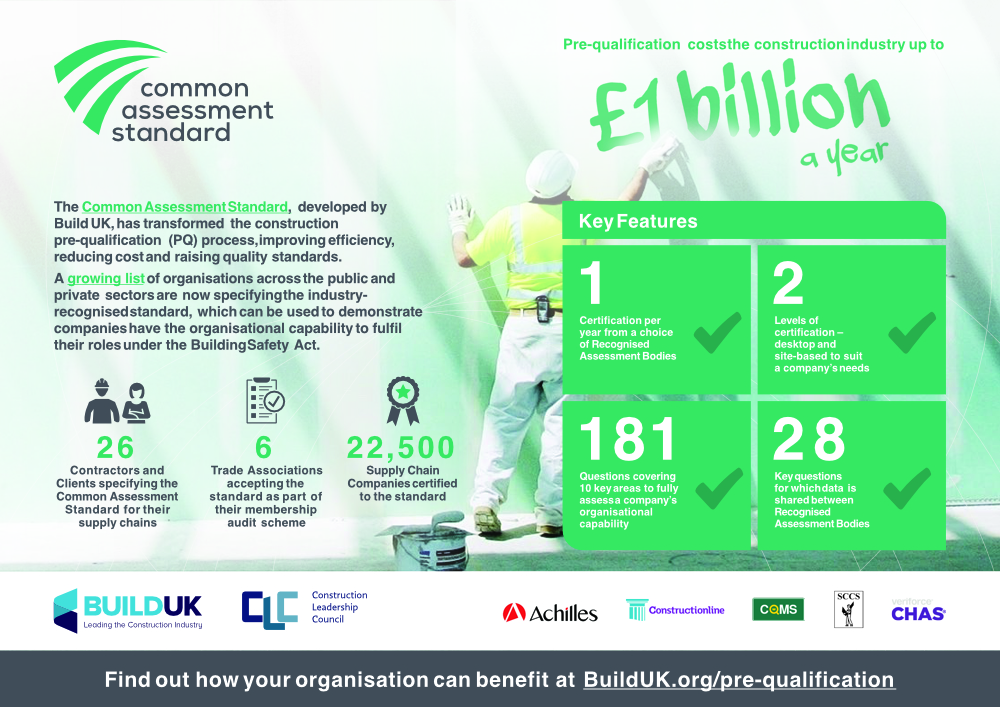The common assessment standard
[edit] About the common assessment standard
The Common Assessment Standard (CAS) is an industry-agreed set of questions and corresponding assessment standards for the pre-qualification of suppliers. There are two levels of certification: desktop and site-based, which build on the PAS 91 pre-qualification questionnaire, helping contractors achieve compliance and mitigate risks across essentially 13 key areas of risk management. Evidence of compliance in these areas is normally required once a year via an online portal.
The Common Assessment Standard, was developed by Build UK, the Civil Engineering Contractors Association (CECA) and other accreditation bodies and industry experts, it is regularly reviewed. It was launched initially in 2019, at which time CHAS became the first assessment body to offer the scheme. In 2021 the introduction of a data-sharing agreement accelerated its adoption, meaning the details of those who pass the assessment can be accessed via any of the providers, regardless of which assessment body carries out the audit. On July 1, 2024 Version 4 of the Common Assessment Standard was published, including a new Building Safety section, ensuring it can be used to demonstrate companies have the organisational capability to fulfil their roles under the Building Safety Act. On 1 July 2025, Build UK published its updated version of CAS, with a significant change being that the Building Safety section, which had previously been optional, now being a mandatory requirement for all companies that carry out design or building work under the Building Safety Act. The section had been ‘advisory’ for the first 12 months after its introduction to allow the industry to get up to speed with the new requirements.
Below is a lists of the contents of Version 4 of the Common Assessment Standard issued in 2024 (with the previous headings from the 2023 version in brackets) both the new and old versions cover 10 key areas;
- Section 1: Identity
- Section 2: Financial
- Section 3: Corporate and Professional Standing
- Section 4: Health and Safety
- Section 5: Environmental
- Section 6: Quality
- Section 7: Building Safety (previously Equality)
- Section 8: Fairness, Inclusion and Respect - FIR (previously Corporate Social Responsibility- CSR)
- Section 9: Information Security (previously Information Security and GDPR)
- Section 10: Information Management (IM)
The Common Assessment Standard is now a leading accreditation programme that is recognised industry-wide and is designed to improve efficiency and reduce cost in the construction pre-qualification (PQ) process. As an accreditation system designed to standardise the pre-qualification process, it helps both clients and contractors improve supply chain efficiency, reduce supply chain risks, and find reliable business opportunities. Clients can access a database of qualified contractors via the services of the assessment bodies.
In 2022, 16,000 supply chain companies were certified to the scheme, with 22 contractors and clients specifying it as a requirement and 4 trade association requiring it as a standard. Now in 2024 22,500 supply chain companies are certified with the scheme, 26 contractors and clients specifying it and 6 trade associations requiring it as a standard. Within the public sector, the Crown Commercial Service (CCS) has for some time asked contractors appointed to seven-year frameworks to assess their supply chains using the Common Assessment Standard. However in 2023 the Procurement Policy Note (PPN) 08/16 advising of this, was changed with PPN 03/23 requiring the use of the CAS or PAS 91 for substantial construction and other public works. In 2024 it is recommended that Central Government departments and wider public sector bodies should use the Common Assessment Standard to pre-qualify suppliers in accordance with PPN 03/24.
There are two levels of certification: desktop and site-based. Companies apply to a Recognised Assessment Body for the certification level that is most appropriate for their business based on a range of factors including trade, size and the requirements of their clients. For companies that employ fewer than 10 employees and have a turnover below £1.8 million or a balance sheet total less than £1.8 million, the assessment standards are applied in a proportionate way. A guide to the question set has been published to help companies prepare for an audit by a Recognised Assessment Body.
[edit] Related articles on Designing Buildings
- Appointing consultants.
- Common minimum standards.
- Constructionline.
- Construction contract.
- Government construction strategy.
- Invitation to tender.
- PAS 91.
- Pre-qualification standard 2021.
- Pre tender interview.
- Procurement route.
- Procurement policy note PPN.
- Public sector PQQs look to the Common Assessment Standard.
- Selection criteria.
- Tender.
[edit] External links
- For further information https://builduk.org/priorities/increasing-productivity/pre-qualification/
- Infographic https://builduk.org/wp-content/uploads/2022/04/Common-Assessment-Standard-Infographic.pdf
- The set of CAS questions can be viewed here; https://builduk.org/wp-content/uploads/2022/06/Common-Assessment-Standard-Question-Set-Version-3.1.pdf
Featured articles and news
Zero carbon social housing: unlocking brownfield potential
Seven ZEDpod strategies for brownfield housing success.
CIOB report; a blueprint for SDGs and the built environment
Pairing the Sustainable Development Goals with projects.
Latest Build UK Building Safety Regime explainer published
Key elements in one short, now updated document.
UKGBC launch the UK Climate Resilience Roadmap
First guidance of its kind on direct climate impacts for the built environment and how it can adapt.
CLC Health, Safety and Wellbeing Strategy 2025
Launched by the Minister for Industry to look at fatalities on site, improving mental health and other issues.
One of the most impressive Victorian architects. Book review.
Common Assessment Standard now with building safety
New CAS update now includes mandatory building safety questions.
RTPI leader to become new CIOB Chief Executive Officer
Dr Victoria Hills MRTPI, FICE to take over after Caroline Gumble’s departure.
Social and affordable housing, a long term plan for delivery
The “Delivering a Decade of Renewal for Social and Affordable Housing” strategy sets out future path.
A change to adoptive architecture
Effects of global weather warming on architectural detailing, material choice and human interaction.
The proposed publicly owned and backed subsidiary of Homes England, to facilitate new homes.
How big is the problem and what can we do to mitigate the effects?
Overheating guidance and tools for building designers
A number of cool guides to help with the heat.
The UK's Modern Industrial Strategy: A 10 year plan
Previous consultation criticism, current key elements and general support with some persisting reservations.
Building Safety Regulator reforms
New roles, new staff and a new fast track service pave the way for a single construction regulator.
Architectural Technologist CPDs and Communications
CIAT CPD… and how you can do it!
Cooling centres and cool spaces
Managing extreme heat in cities by directing the public to places for heat stress relief and water sources.
Winter gardens: A brief history and warm variations
Extending the season with glass in different forms and terms.
Restoring Great Yarmouth's Winter Gardens
Transforming one of the least sustainable constructions imaginable.



























Comments
[edit] o make a comment about this article, click 'Add a comment' above. Separate your comments from any existing comments by inserting a horizontal line.